Structured data implementation across top 100 eCommerce sites
Structured data is a way of providing information to search engines about the content of your pages to improve their understanding of what the content is about.
There are three methods of implementing structured data:
JSON-LD – the recommended method by Google
A JavaScript code embedded in <script> tag in the <head> and/or the <body> of an HTML page.
Microdata
An HTML specification that uses tag attributes to name the properties. Microdata is typically used in the <body> but can also be implemented in the <head>.
RDFa
Utilises an HTML5 extension that introduces HTML tag attributes to mark-up corresponding user-visible content to improve search engine understanding of it. RDFa can be used in the <head> and the <body> of an HTML page.
Why is schema important for SEO?
Implementing schema allows search engines to understand the content of your HTML pages, which may improve organic visibility and direct more traffic to the website. It also creates an opportunity for rich snippets, which may boost your CTR.
How to implement?
Create structured data either by utilising online schema generators or by coding it in a text editor. Make sure you test your code before implementation using either:
Once implemented, Google Search Console will provide information about errors and issues. It’s recommended to regularly monitor GSC data to ensure structured data does not contain errors.
Schema markup for an eCommerce website
eCommerce websites can utilise a number of schema types to maximise a search engine’s understanding of their content. Google recommends using the following schema types for eCommerce businesses:
- LocalBusiness
- Product
- Reviews
- HowTo
- FAQ
- BreadcrumbList
- WebSite
- VideoObject
Additional schema types can also be implemented:
- Organization
- Offer
- AggregateRating
- Article
- ShippingDetails
- ClothingStore
- MensClothingStore
- ElectronicsStore
- ToyStore
- ShoeStore
- OnlineStore
Depending on the offering, additional types can also be utilised:
- Event
- Reservation
- Person
- Recipe
- Vehicle etc.
Schema mark-up for top 100 eCommerce websites
We reviewed a sample of URLs from the top 100 US and UK eCommerce websites based on AfterShip data (excluding auction and businesses, such as eBay and Etsy retrospectively) to evaluate their utilisation of schema markup. The sample includes the following templates:
- Homepage
- Category page
- Product page
- FAQ page
- Location page
- Recipe page
The audit shows schema mark-up in JSON-LD as the preferred implementation method across the above page templates mentioned, based on recommended vs implemented schema.
Implications of not implementing schema by schema
Implementing schema within eligible pages on a website can have numerous benefits for organic performance. Below are some examples showcasing how marking up your content can have a positive effect on your website.
- BreadcrumbList – Helps Google to understand the page’s position in the site’s hierarchy. It may aid users to navigate the site and improve their experience.
- FAQPage (Question, Answer) – A correctly implemented FAQPage schema increases the chances of rich results in SERP, as displayed below.

- LocalBusiness – Implementing LocalBuisness can increase the chances of a business being prominently displayed on Google Search or Maps, such as a carousel. LocalBusiness structured data allows you to provide information such as: business opening hours, departments within your business, contact details, reviews, etc.
- Product (Offer, AggregateRating, Review) – Probably the most important schema as far as eCommerce websites are concerned, as correctly implemented Product schema can enhance the listing within SERP and potentially increase CTR to the website by making your listing more visually appealing and providing more information to the end user in the SERP, such as:

- Organization – Organization schema provides information about a business. Additionally, the Logo property within Organization markup sends a strong signal to Google to use the provided logo in their knowledge panel.
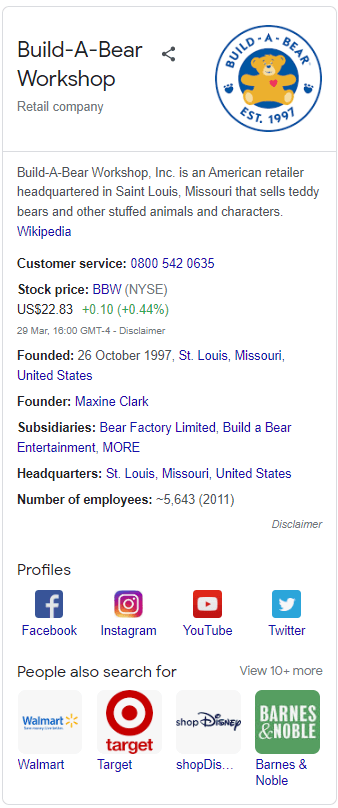
- BlogPosting – Implementing BlogPosting or Article schema can help Google understand the page’s content and display the result in a more prominent way in SERP.
Here is an example of a page with Article structured data:
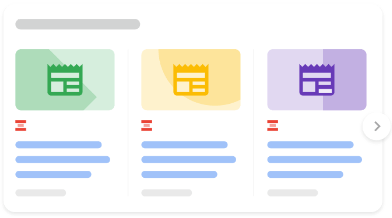
- Recipe – A recipe schema allows to mark-up information such as:
- ingredients
- preparation time
- cooking time
- instructions
- aggregate Rating
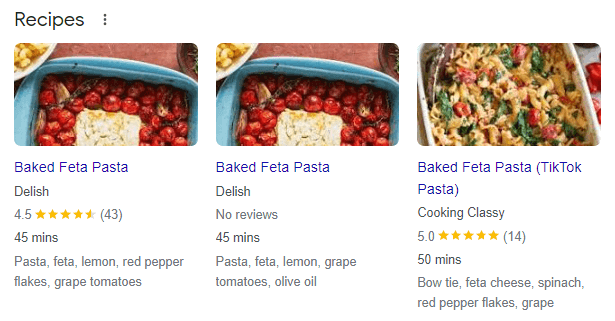
Alternative mark-up options
As mentioned earlier, not implementing structured data reduces the chances of content from being better understood and prevents relevant pages from appearing as rich results in SERP. Our research shows 33.45% of URLs don’t currently contain any structured data in JSON-LD. That may lead to reduced visits to the websites and potentially unfulfilled transactions and lost revenue.
Some brands use alternative formats to mark-up structured data with various level of success.
Lululemon
Although schema has been implemented to the Lululemon site using microdata, which is a valid structured data format, the rich result fails to detect structured data.

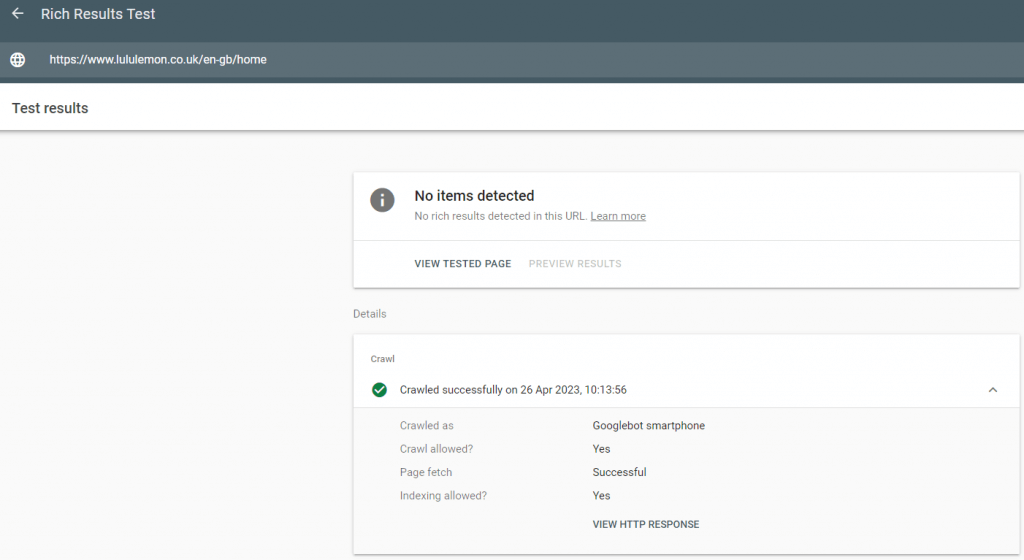
To maximise the potential of structured data and to minimise potential errors, it’s advisable to use JSON-LD format.
Claires
PDP pages across Claires use JSON-LD format for Product and Offer and Microdata format, as well as Microdata mark-up for AggregateRating, IndividualProduct, Review, Person, and Rating, resulting in duplicated items detected in the rich result test.
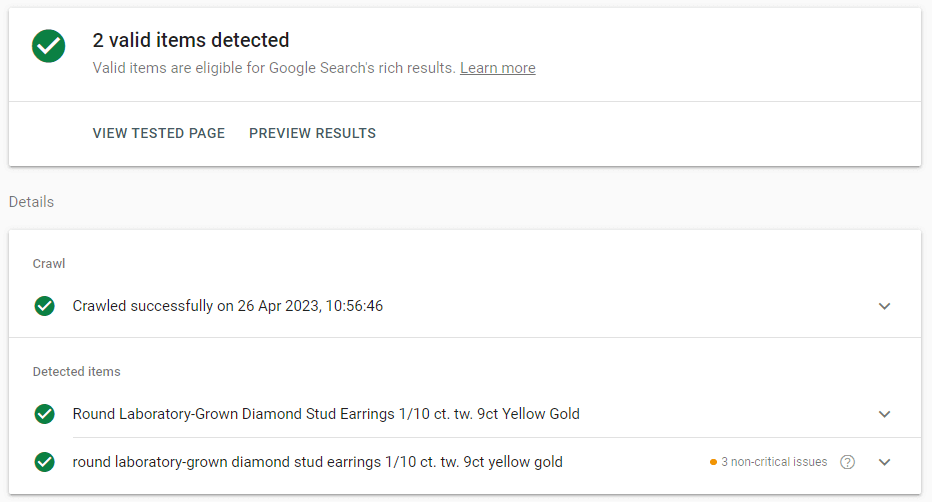
It’s not necessary to duplicate the mark-up in various formats as it may lead to potential issues:
- Difficulty in maintaining structured data
- Mark-up with errors/issues being reported on instead of error-free one
- Additional resources required for maintenance and monitoring
- Skewed data for reporting
The side-to-side comparison of the rich result test for Claire’s PDP page shows discrepancies between implemented structured data with JSON-LD and Microdata.
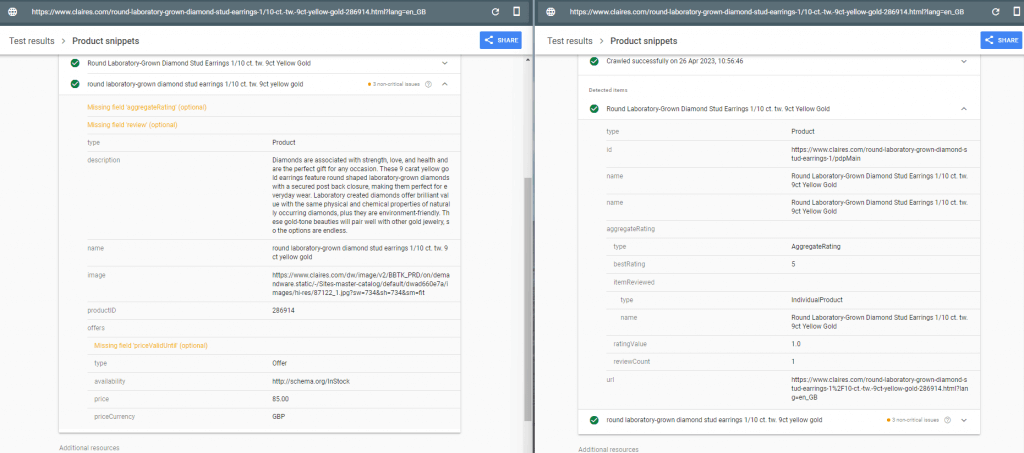
JSON-LD mark-up does not contain AggregateRating or Review schema type, despite the information being readily available on the page and marked-up with Microdata. Although these fields are not required, providing information about product ratings and reviews Claire’s can potentially attract more users from SERPs. Below are examples of the differences between a SERP result without and with AggregateRating and Review schema implemented and visible in search results.


The Microdata mark-up does not include product description, product image or available offer details.
To prevent potential issues with rich results, it’s advisable to use one structured data format and mark-up all eligible information either by nesting or mark them as individual items.
A mock-up structured data for Product that includes Offer, AggregateRating, and Reviews in JSON-LD results in valid items during the rich result test.
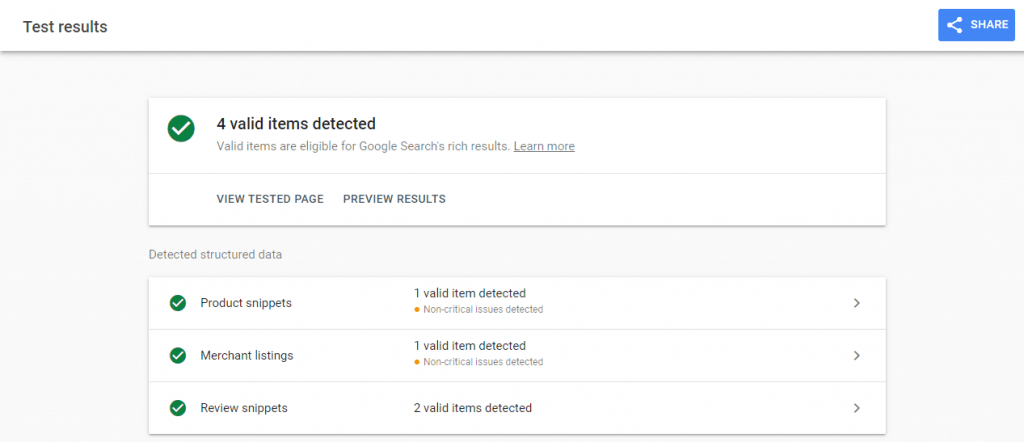
A number of structured data can be utilised per page type as long as the content marked-up with schema is visible to the end user:
- Category page
- FAQ page
- Location page
- Product page
- Homepage
- Blog posting
- Recipe
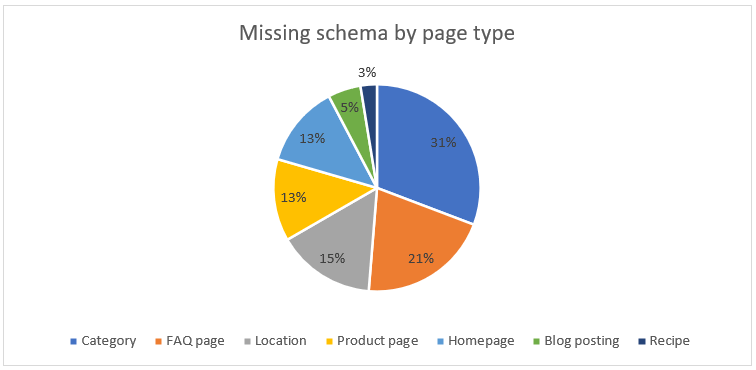
Coach
Coach’s website is affected by an Incorrect Type Value issue for Organization schema implemented site-wide.
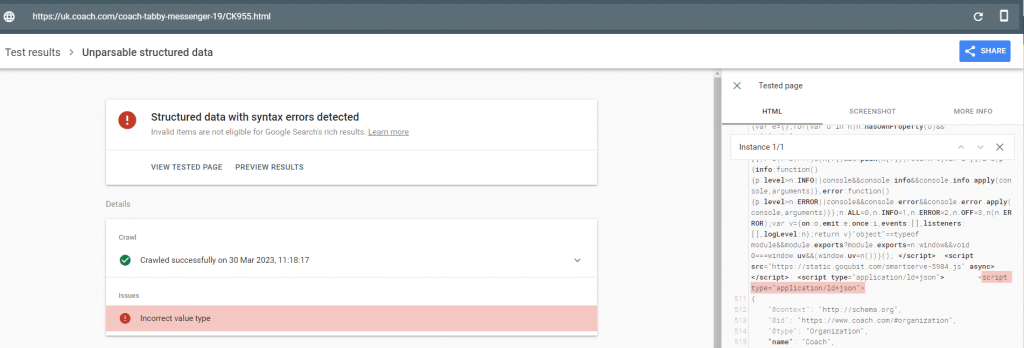
Removing duplicated string <script type=”application/ld+json”> resolves the issue.
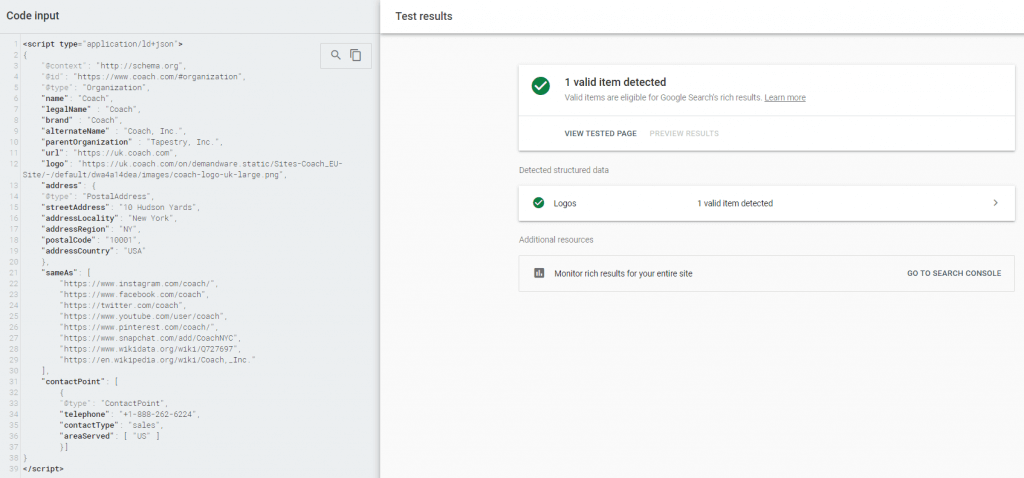
Here is a list of the most utilised structured data:
- BreadcrumbList
- Website
- Organization
- Offer
- Product
A number of websites utilises Organization/LocalBuisness schema to its full potential.
Instead of implementing just the top level Organization schema, the following businesses have taken advantage of business specific schema types, and implemented relevant schemas: MobilePhoneStore, LiquorStore, JewelryStore, ClothingStore, DepartmentStore.
- https://www.kohls.com
- https://www.target.com/
- https://claires.com
- https://www.riverisland.com
- https://www.hobbycraft.co.uk
Kohl’s ensures that each department has been marked up by providing additional types of LocalBuisness:

Target also utilises available department types to increase visibility for relevant searches.
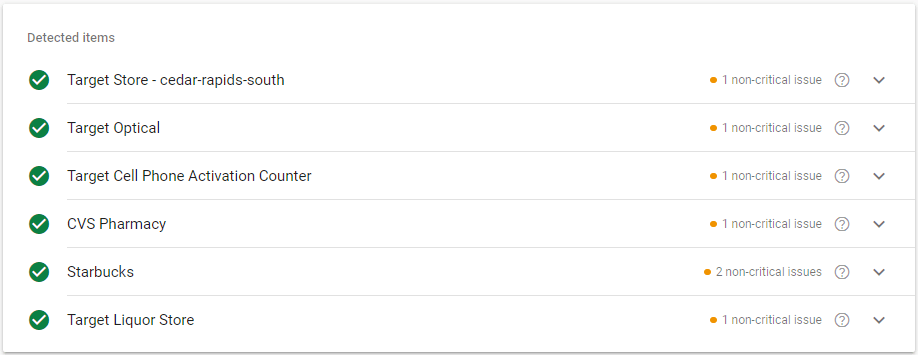
BreadcrumbList schema has not been implemented across 12% of audited URLs, despite being eligible for the markup. This is a missed opportunity for structured data implementation.
FAQ schema is the second most underutilised schema, followed by LocalBusiness.
Brands not taking advantage of structured data
A number of brands do not utilise structured data, limiting Google’s understanding of their content and relation between entities.
Glossier does not utilise the following schemas, despite available content:
- Organization/Website
- BlogPosting
- FAQ
- BreadcrumbList
Summary (JSON-LD only)
- 45% URLs does not contain any structured data
- 27% URLs contains structured data with errors
- Parse error is the most common erroring JSON-LD mark-up
- Category page is the main page type that does not have any schema implemented
- The most overused schema, implemented on majority of pages as opposed to recommended homepage is Organization schema (41% of reviewed URLs contain Organization schema not on a homepage or about us page)
Schema is a powerful tool in any SEO’s toolkit to assist Google’s understanding of a website’s content. If implemented correctly it can increase visibility in the SERPs, increase traffic to the website and potentially increase number of sales.